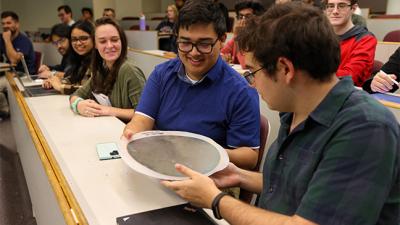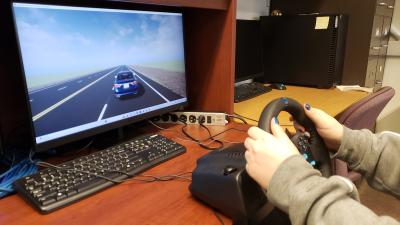MSE News and Events
Michael Deagen (Ph.D., December 2018) received the Rensselaer Founders Award of Excellence at the Honors Convocation ceremony on October 20, 2018. Established in 1994, the Founders Award "honors students who embody qualities of creativity, discovery, leadership, and the values of pride and responsibility at Rensselaer."
This distinction is meant to honor young researchers who have made significant contributions to their respective fields within Polymer Science and Engineering.
Institute News
Rensselaer Polytechnic Institute (RPI) and the Icahn School of Medicine at Mount Sinai will offer a joint Ph.D. program in health sciences engineering beginning in the fall semester of 2025. RPI is a world-renowned technological research university known for its engineering, technology, and science programs. Icahn Mount Sinai is the academic arm of the Mount Sinai Health System, which includes eight hospitals and a vast network of ambulatory practices throughout the greater New York City region. The Ph.D.
On July 18, Rensselaer Polytechnic Institute (RPI) and NORDTECH will host a day-long Workforce Development Summit on the RPI campus that will bring together government, industry, nonprofits, and academic partners to address education and workforce development in chips and semiconductors critical to the prosperity and security of the nation.
On July 18, Rensselaer Polytechnic Institute (RPI) and NORDTECH will host a day-long Workforce Development Summit on the RPI campus that will bring together government, industry, nonprofits, and academic partners to address education and workforce development in chips and semiconductors critical to the prosperity and security of the nation.
From lane-keep assistance to blind spot detection, today’s cars come equipped with autonomous driving features that make driving easier and safer. Rene Mai, a doctoral student at Rensselaer Polytechnic Institute, imagines a world in which humans and machines complement each other’s strengths to do more together, a concept known as “symbiotic autonomy.”
Hunter Belanger ’18, ’19G, Ph.D., assistant professor in Rensselaer Polytechnic Institute’s Department of Mechanical, Aerospace, and Nuclear Engineering (MANE), is one of four researchers nationwide to receive a Department of Energy Distinguished Early Career Award.The five-year, $625,000 grant will fund Belanger’s research aimed at making nuclear power safer and more efficient, supporting state and national efforts to transition away from carbon-emitting energy sources.



 Rensselaer Polytechnic Institute and the Icahn School of Medicine at Mount Sinai to Offer Joint Ph.D. Program in Health Sciences Engineering
Rensselaer Polytechnic Institute and the Icahn School of Medicine at Mount Sinai to Offer Joint Ph.D. Program in Health Sciences Engineering
 RPI To Host NORDTECH Workforce Development Summit
RPI To Host NORDTECH Workforce Development Summit
 RPI Doctoral Student Designs Ways for Humans and Machines to work ‘symbiotically’
RPI Doctoral Student Designs Ways for Humans and Machines to work ‘symbiotically’
 With New Grant, RPI Researcher Unravels Causes of ‘Neutron Noise’ in Nuclear Reactors
With New Grant, RPI Researcher Unravels Causes of ‘Neutron Noise’ in Nuclear Reactors